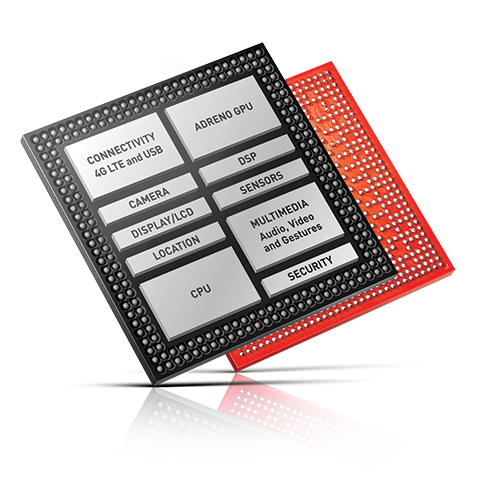
Qualcomm recently announced two new mobile SOC’s to their entry-Level 200 and 400 series lineup. The Snapdragon 212 and Snapdragon 412 both bring moderate bumps on the CPU clock speeds, using the same base architecture and bringing things like carrier band aggregation to their lower-end chips for faster LTE speeds.
The Snapdragon 212 remains a 28nm quad-core ARM Cortex processor with a new top clock speed of up to 1.3GHz per core (up from 1.1GHz in the 210). The rest of the SOC remains unchanged with the same graphics, RAM and communication and charging standards supported.
The Snapdragon 412 sits in the middle of what is becoming one of Qualcomm’s more crowded chip series. The 412 also keeps the 28nm manufacturing process in a quad-core ARM Cortex A53 and brings a speed boost of 1.4GHz per core (up from the 410’s 1.2GHz). Coming from the 410 chip, the 412 introduces the X5 LTE modem to their lower tier of the series and sees a modest boost in memory speed (up to 600MHz from 533MHz). As with the 212, the rest of the SOC remains unchanged with the same graphics, ram and communication and charging standards supported.
With their Snapdragon offerings, Qualcomm is a major player in both the high end but also the now growing and more competitive mid-range device segment. These chips power a large number of the mainstream mid to high-end Android phones and tablets we see here in Australia — right now I have 3 phones on my desk, the LG G4, Sony M4 Aqua and a Moto G 2nd gen – all of these devices and more are powered by Qualcomm Snapdragon chips.
With other chip makers such as Intel and China’s Mediatek ramping up their mobile offerings, Qualcomm will be under increasing pressure from OEMs and consumers to keep pricing down whilst improving features and maintaining stability.
Are you excited to see spec boosts at this end of the market? Could one of these processors power your next device? Tell us in the comments!




Qualcomm would be hurting after LSI’s Exynos design wins.